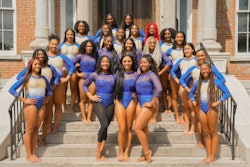
“This anniversary is a very pivotal civil rights moment,” said Maha Ibrahim, program managing attorney at Equal Rights Advocates (ERA), an organization focused on gender justice in workplaces and schools across the country. “It’s a moment when this administration is really testing students to see whether we can keep and advance this right or lose 53 years of very hard, very well thought out work and advocacy that students, professors and advocates had carefully constructed.”
Ibrahim said the biggest accomplishment of Title IX may have also led to the biggest challenge. Current student-athletes may not realize that these rights didn’t always exist and so they haven’t been preparing for the assault on Title IX from the Trump administration.
“We still haven’t reached equity in sports,” said Ibrahim. “Men’s teams are still far out resourcing women’s teams. The availability of spots on men’s teams are still far greater across campuses. The prevalence of campus violations of sports equity and Title IX is rampant and constant.”
ERA is part of a national Title IX litigators network, and Ibrahim said there are always multiple violations at schools across the country, even in states that are considered progressive as far as sports equity.
“The accomplishments are that we live in a world where girls at very young ages in every state in our country automatically start thinking about what sports they might be interested in,” Ibrahim noted. “Parents across the country think about what sports to put their girls in. … Title IX is a huge part of that culture change.”
On Feb. 5, the White House issued Executive Order 14201 (“Keeping Men Out of Women’s Sports”) and 28 states have followed suit in barring transgender individuals from competing in sports associated with the gender with which they identify. People supportive of this have asserted that allowing transgender women to compete in women’s sports is a violation of Title IX. Last year, the group Independent Women held a national bus tour, Take Back Title IX Summer 2024 Bus Tour, and will do so again this year to celebrate the Trump administration’s policies.
Ibrahim said focus on trans sports participation serves as a distraction from other Title IX issues. “ERA is very trans inclusive and we are absolutely for trans sports equality,” said Ibrahim, noting that less than 2% of the student-athlete population are trans. “Those who are violently anti-trans are using that red herring to dismantle basic rights for all women and girls, even if they’re cisgendered.”
Ibrahim said to defend Title IX, advocates must look at the state level. Supporters should continue pressure on the federal level, but should also look to local communities, student activist groups, school boards and colleges and universities and fight for protections to buttress the purpose and intent of Title IX. ERA will continue to fight for Title IX through litigation and providing legal advice and support.
“This is leveling the playing field so we can all have access,” said Ibrahim. “When you limit access, you’re limiting participation for everybody.”
An area where Title IX may also be challenged is in the execution of the recently reached House Settlement, an unprecedented agreement in the House v NCAA antitrust lawsuit that allows direct compensation of collegiate athletes for their name, image and likeness (NIL). Part of the settlement is a $2.8 billion payment from the NCAA and major athletic conferences to former and current athletes.
Going forward, Division I athletic programs will be expected to give direct compensation to student-athletes. Not only will the lion’s share of this likely go to football and men’s basketball and to a lesser extent women’s basketball, it will impact funds available for non-revenue-generating sports such as fencing, track and field, swimming, diving and soccer. Many of these are Olympic sports for which intercollegiate athletics is a vital training ground.
Looking to the future, Bubba Cunningham, director of athletics at University of North Carolina, Chapel Hill, and board of directors member of the U.S. Olympic & Paralympic Committee, noted, “If we look five to 10 years [in the future], I think we’ll probably have a bifurcated system. I do think that football and basketball — maybe a handful of others — will be compensated … and we’re going to have a whole group of sports that are going to be subsidized by a different funding model.”
In June, the Knight Commission on Intercollegiate Athletics, an independent group focused on prioritizing health, safety, education and success for student-athletes, held a session titled “Protecting College Olympic Sports,” in which people proposed various scenarios. At that time, it was noted that very few women’s sports programs at institutions in Power Five (Football Bowl Subdivision) conferences operate at a profit. Concerns over the loss of women’s sports due to lack of funding are palpable.
“We have to think very creatively on how to continue to grow our resource base, fund programs and provide these opportunities,” said Max Siegel, CEO, USA Track & Field.


















